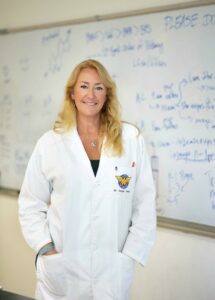Toxic Beauty: The Effects of Phthalates and Bisphenols on Human Stem Cells and Embryo Development
Our Distinguished Speaker

Sonya Schuh, PhD
Access the Zoom recording HERE
Abstract
Dr. Schuh’s research focuses on reproductive and developmental biology and toxicology. Her talk delves into the prevalent challenges of the current plastics and environmental toxin crisis, and their effects on human health, fertility, and congenital defects. Ubiquitous chemicals like bisphenol A (BPA) and phthalates, present in a wide variety of plastics, cosmetics, personal care, and household products, disrupt hormones and pathways and act as endocrine-disrupting chemicals (EDCs) in the body. Despite efforts over the last several years to replace BPA with alternatives labeled “BPA-Free,” Dr. Schuh’s work has revealed that these substitutes actually carry similar, and in some cases much worse, toxic risks. She and her all–woman undergraduate research team were recently featured in a docuseries on HBO Max entitled “Not So Pretty,” which highlights their research on the toxic and teratogenic effects of bisphenols and phthalates on embryo development. Schuh, a self-proclaimed “Science Queen” and her team of “STEM Chicks,” also did testing of chemicals in various beauty products featured by the series. The Schuh lab has since filmed another upcoming documentary and has published several impactful manuscripts, with this work getting national and global attention. All of Dr. Schuh’s recent findings emphasize the potential implications for human health and fertility, especially for women, urging consumer awareness, policy reform, sustainable alternatives, and putting ‘people over profit.’
About The Speaker
Dr. Sonya Schuh is a passionate mother, teacher, scientist, artist, athlete, environmentalist, and STEMinist. Originally from San Diego and inland Southern California, she grew up exploring nature, the ocean, and enjoying all things outdoors. An inquisitive bold nature, fascination with life and the natural world, and being the product of educator parents, would eventually lead her to a science career. She earned a BS in Marine Biology and Zoology from Humboldt State University, where she conducted marine research and worked as a Marine Naturalist. She then completed her PhD in Physiology and Biophysics at the University of Washington in Seattle, focusing on chemical effects on sperm. Later, at Stanford’s Stem Cell Biology Institute, she delved into genes and environmental factors affecting human fertility and led the largest study to date on genes linked with ovarian reserve (oocyte number) in women. Joining Saint Mary’s College of California in 2013, she initiated a research program on the impact of endocrine disruptors on embryos of various species and animal and human stem cells. Dedicated to teaching and diverse collaborations, her most cherished accomplishment is her three children, inspiring her ongoing commitment to shaping a better world. Dr. Sonya says, “Of all my accolades and work, my three amazing children are hands-down my best and proudest accomplishments, with my long list of wonderful students coming in second. They all inspire me to continue paving new paths, breaking barriers, challenging status quos, and working towards a better future. We can make a difference by the way we pursue answers and solutions, communicate our work, treat other people, and care for all people and life of this earth. I still have a lot of hope.”
Zoom link to be shared with attendees the day of the event.
Please register before Thursday, February 8, 2023, 12 noon. Your email address is needed to send the Zoom link, which will be shared with attendees on or before the day of the event via Brown Paper Tickets.
Please visit the CalACS website www.calacs.org to register for this meeting or use Brown Paper Tickets.
The event is FREE and open to the community. More information: e-mail WCC co-chair Elaine Yamaguchi.
